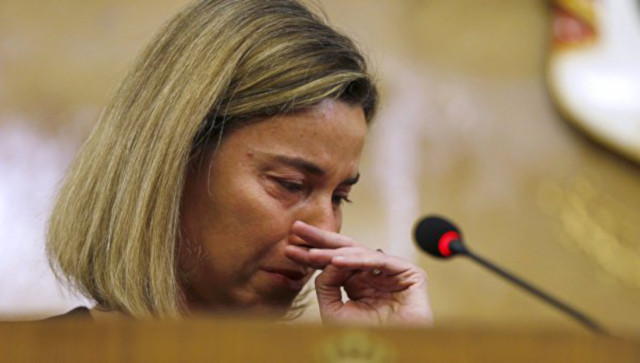by Peter Jenkins
According to today’s White House statement, President Donald Trump has decided not to denounce the July 2015 nuclear agreement with Iran (Joint Comprehensive Plan of Action or JCPOA) or encourage Congress to kill it, but to ask “the entire world to join us in demanding that Iran’s government end its pursuit of death and destruction.”
Europe’s leaders must decide now whether they will seek to placate President Trump by doing more than parrot US claims that an “evil” and “malign” Iran is the greatest source of instability and mischief in the Middle East. They will come under pressure to take action not only from the United States but also domestically. Media and lobbies hostile to Iran exist in Europe as well as in the United States.
On October 12, an editorial writer for The Times argued:
Britain and Europe must work with the US to block Iran’s race for regional mastery. If the Europeans, Britain included, want to protect the nuclear deal then they have to demonstrate that they are willing to step up the struggle against Iran’s race for regional mastery. The alternative would be a rupture in the alliance, with the US and Europe on opposing paths.
This way of thinking presents a mortal threat to the JCPOA. There is no reason to believe that “stepping up the [regional] struggle against Iran” would “protect” the JCPOA. Rather, as advocates of stepping up the struggle must surely know and want, such actions would spell the probable destruction of the JCPOA. Iran’s Islamic leaders have shown time and again that they believe in retaliation. Retaliation is an effective form of defence, in their playbook.
A prize example of this was the Iranian response to the imposition of nuclear-related sanctions between 2007 and 2012. Rather than succumbing meekly to this “ratcheting up of pressure,” they expanded the number of centrifuges at their disposal and started producing uranium enriched to 20%, only a step away from weapons-grade. This was their way of putting counter-pressure on Europe and the United States to abandon all pre-conditions for a negotiation and concede that Iran was entitled to enrich uranium for peaceful purposes.
The implication is clear. It would be unwise for European leaders to imagine that they can adopt aggressive policies to counter Iranian “death and destruction” and, at the same time, preserve the JCPOA and develop further economic ties. Iran would react to European aggression by trying to hit Europe where it hurts—by denouncing the JCPOA and shunning European investment.
Europe ought to have enough sense to realize the shortcomings of the analysis behind the Times editorial and today’s White House statement. That analysis, rather than being objective, reflects Israeli, Saudi, and therefore US perceptions of their regional interests—not Europe’s Middle East interests.
Lying behind these rhetorical attacks on Iran are several Israeli, Saudi, and US grievances: Iran’s political and logistic support for Lebanon’s Hezbollah; Iran’s political and military support for the Syrian government; a belief that Iran is fomenting unrest in some of the Gulf states and has supplied weapons to anti-Saudi forces in Yemen; Iran’s longstanding refusal to recognize Israel and its support for Palestinian resistance to Israeli occupation and siege tactics; and casualties inflicted on US forces by Iraqi Shi’a militias.
Europe, however, is entitled to view these matters differently.
Hezbollah’s possession of 160,000 rockets/missiles, thanks largely to Iran, can be seen as a way to deter Israeli aggression, such as the 2006 assault that resulted in the deaths of hundreds of Lebanese civilians, and enormous destruction, in retaliation for the kidnapping of an Israeli soldier. That Israeli campaign caused outrage in Europe.
Six years ago much of Europe sided with the Syrian opposition. Europe has since come to yearn for an end to the fighting in Syria, for both humanitarian and selfish reasons, having experienced a Syrian refugee crisis. An end to the fighting and intra-Syrian talks are also Iran’s goals.
Europe is horrified by the scale of human suffering in Yemen but does not hold Iran responsible for it. That responsibility lies with Saudi Arabia, which initiated hostilities and used force recklessly. Iran is not an obstacle to a cessation of hostilities.
Europe would like Iran to recognize Israel. But Europe would also like Israel to make a sincere attempt to create conditions permitting Israeli withdrawal from occupied Palestinian land and the dismantlement of illegal settlements. A peace agreement acceptable to both Israel and Palestine could lead to Iranian recognition of Israel.
US casualties in Iraq are a bad reason to pick a fight. Iran suffered hundreds of thousands of casualties during a war in the 1980s in which Iraq enjoyed US political and operational support.
In short, taking sides in the Middle East’s murderous quarrels is not in Europe’s interest. Being a force for peace is Europe’s Middle East vocation, one entirely consistent with preserving the JCPOA. US participation was essential to that deal’s birth. Responsibility for ensuring the survival of the deal must now fall to the rest of the world.
Photo: EU foreign policy chief Federica Mogherini






Please discontinue the strange italicised sidebars that now appear in items on this website. Are they meant to be block quotes? Are we meant to read the right-hand column before we read the one on the left? The very small sized serif typeface you now use for the main test is difficult to read on-screen. In short, your redesign is awful.
Ignore it.It is a decision paid for by mega doners .